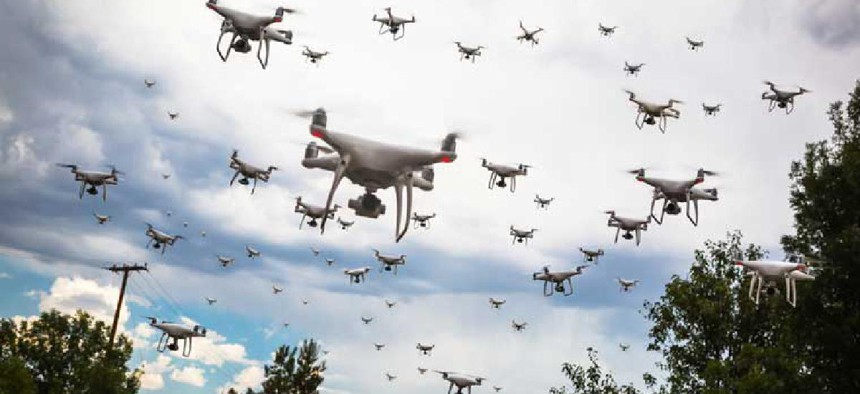DOD looks to spur domestic drone manufacturing


Connecting state and local government leaders
To decrease its reliance on small unmanned aerial systems manufactured by Chinese firm DJI, the Department of Defense is looking to help establish a domestic manufacturing base for lightweight drones.
To decrease reliance on small unmanned aerial systems manufactured by Chinese firm DJI, the Department of Defense is looking to help establish a domestic manufacturing base for lightweight drones.
DOD's Trusted Capital Marketplace would help broaden the pool of available drone manufacturers.
Originally scoped out as a web-based platform to support connections between venture capital and emerging tech firms, the marketplace has evolved from a "complicated expensive website" to match-making meetings on "very, very focused topics," Ellen Lord, DOD's undersecretary for acquisition and sustainment, said at an Aug. 26 press briefing.
In October, DOD will convene acquisition meet up with an eye to diversifying the small drone industrial base. Lord said focusing on drones for the first marketplace meetup made sense because of the reliance on China-made tech.
"Essentially we don't have very much of a small UAS industrial base because DJI dumped so many low-priced quadcopters on the market, and we then became dependent on them both from the defense point of view and the commercial point of view," Lord said during the briefing.
DJI has been criticized before for potential security risks due to concerns that China-made or linked products are dominating the drone supply chain. The Army banned the use of DJI drones in August 2017 due to cyber vulnerabilities.
At a June Senate hearing, Harry Wingo of National Defense University said DJI had a "near monopoly" on drone technology marketed in the U.S. and that its use of proprietary software networks makes it difficult for DOD to ascertain whether the data is safe. Wingo also indicated that security concerns extend to the data-storage practices.
Lord echoed that testimony, saying "we know that a lot of the information is sent back to China from those; so this is not something that we can use."
Those accusations are "false and misleading," DJI spokesman Michael Oldenburg said. "DJI drones do not automatically send data to the Chinese government or to any unauthorized party. An independent U.S. cybersecurity firm has debunked these claims and verified that DJI's hardware and software systems give our customers full control over how their data is collected, stored, and transmitted." he said.
Oldenburg also disputed Lord's assertion that DJI was dumping product to establish market dominance.
"DJI has earned its market-leading position in the drone industry because we have continued to research, develop and deliver the most capable products to the market," he said.
Still, the Pentagon is hoping its "strong demand signal" will help boost domestic capacity in small drones. Lord said.
"What we would like to have are U.S designers and manufacturers of small UAS," she said. "Because not only do we have a need for that in the Department of Defense -- we know it's a very, very large commercial industry -- so we think that we can catalyze that activity and have a safe and secure supply."
This article was first posted to FCW, a sibling site to GCN.





